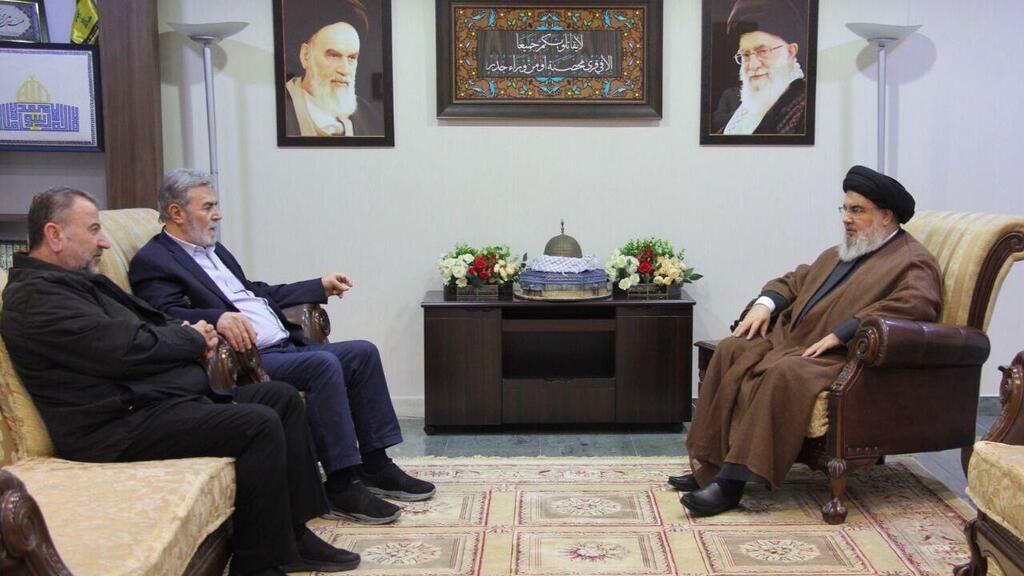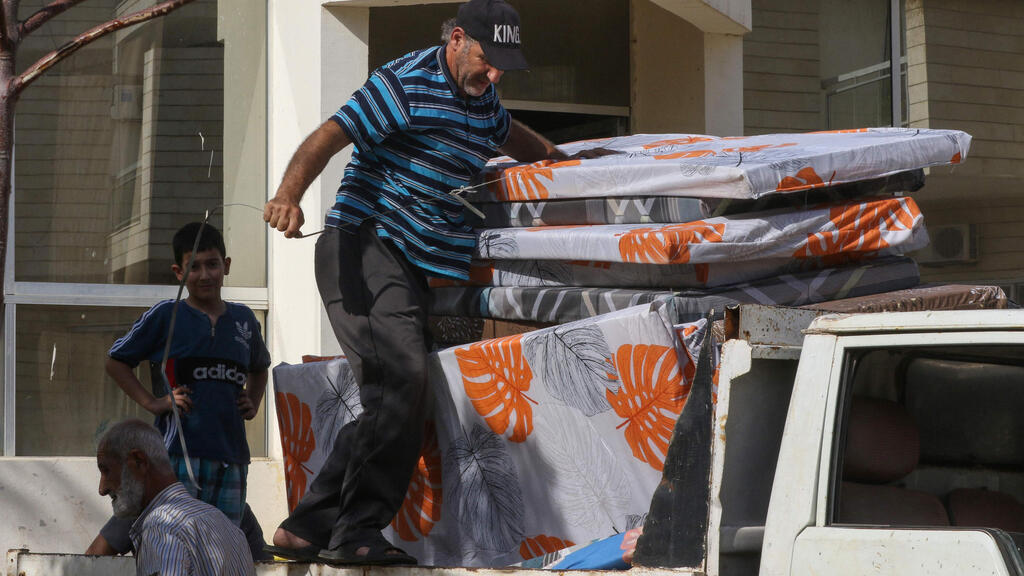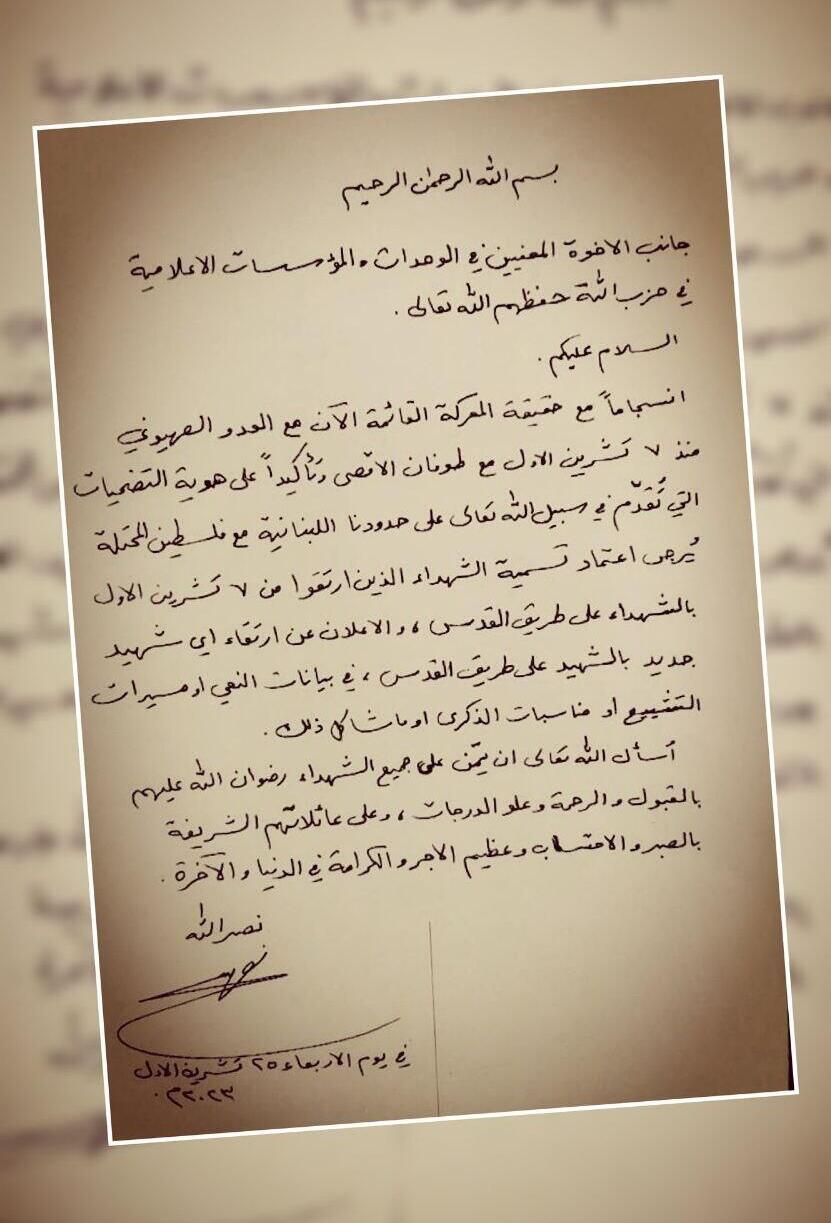Hezbollah's Al-Manar television network published a handwritten letter Wednesday purported to have been written by the terror organization's Secretary General Hassan Nasrallah.
More stories:
Nasrallah, who has remained silent since the start of the Hamas-Israel war and avoided even appearing in front of the cameras, clarified in the letter how his terror group's slain operatives should be treated in statements, funerals and various memorial events. "I ask Allah, for all the martyrs, that Allah bless them with acceptance and mercy and their families with firm standing and honor in this world and in the next," he also wrote.
3 View gallery


Hezbollah Secretary General Hassan Nasrallah meeting with Islamic Jihad chief Ziad al-Nakhala and Hamas deputy chief Saleh al-Arouri
According to the Al-Manar report, Nasrallah also met with Islamic Jihad chief Ziad al-Nakhala, and with Hamas deputy chief Saleh al-Arouri, who both live in Lebanon. At the meeting, the three discussed "the recent events and the war in the various arenas," and assessed what their alliance must do to "achieve a real victory for the resistance" in Gaza, as well as how to put a stop to "Israeli aggression against the Palestinian people in the West Bank and Gaza." Al-Manar reported that the parties "agreed to continue coordination and monitor developments on a daily basis."
The publication of the letter and in the meeting with the leaders of the Palestinian terrorist organizations is evidence that Nasrallah wants to emphasize the unified front and the common Axis of Resistance. Publicly releasing of Hezbollah's death toll is a sort of proof that the organization is participating in the war "on the road to Jerusalem," alongside Hamas and Islamic Jihad. In addition, the statement also mentions the West Bank; thus, Nasrallah is trying to further strengthen his commitment to what is happening in the Palestinian arena.
In the battles on Israel's northern border, Hezbollah members, along with Palestinian terrorists from Hamas and the Islamic Jihad who are also active in southern Lebanon, are trying to attack the Israel Defense Forces troops by a variety of methods. Despite this, the security establishment has assessed in recent days that Iran and Hezbollah have no interest at this stage in risking a war that would in fact lead to the destruction of Lebanon, including parts of Beirut and the area of the Shiite city of Baalbek.
At the outbreak of the war with Hamas, Hezbollah took responsibility for firing anti-tank missiles at Israeli forces on the border with Lebanon, for launching rockets and UAVs to the north, and for damaging IDF infrastructure at the border fence. As a result of these actions, Israelis were killed and wounded, and the IDF attacked inside Lebanon in response. But in the security establishment this is defined as "below the threshold of total war."
According to reports, there is a disagreement between Defense Minister Yoav Gallant and Prime Minister Benjamin Netanyahu regarding the course of action against Hezbollah, with Gallant wanting to surprise the terrorist organization and launch a pre-emptive attack - while the prime minister supports the opposing American position.
Since the outbreak of fighting, Hezbollah has reported at least 37 dead from its ranks, and another two dead from its affiliated militias. The Israeli security establishment estimates that the death toll is even higher, and there have been additional deaths among non-Hezbollah actors during the recent days of fighting on the Lebanese border.
To this day, Nasrallah has maintained ambiguity regarding the future of the campaign, and has refrained from comment. Hassan Fadlallah, a member of Lebanon's parliament on behalf of Hezbollah, who is considered to be close to the group's leader, claimed this week that Nasrallah religiously follows the developments in southern Lebanon and Gaza, and supervises the conduct of the battles in leading the field commanders.
"I told the families of the martyrs of Nasrallah that 'all the martyrs are his sons,'" Fadlallah said. "He directly manages the confrontations with the field commanders and his lack of appearances in the media is part of managing the battle. When it seems necessary, he will appear," he claimed.
In Lebanon they fear war
Because of the fighting and the fear of further escalation, Israeli communities near the Lebanese border have been evacuated in recent days. At the same time, thousands of Lebanese civilians living in communities near the border with Israel have fled their homes. There has not yet been an official evacuation in southern Lebanon, but Lebanese authorities are reportedly preparing for the possibility of a devastating war. A few days ago, the Lebanese newspaper Al-Akhbar reported that, as part of this preparation, essential goods are being moved from dangerous places to safer warehouses. In Lebanon, which has already been in an unprecedented economic crisis for many years, there are also fears of difficulties in the distribution of basic products and the consequences of the situation on the prices that have already increased due to massive inflation.
3 View gallery


Lebanese civilians who fled from the Lebanese border area to Tyre out of fear of a war in Lebanon against Israel
(Photo: Mahmoud ZAYYAT / AFP)
Mohammed Abu Haider, the director general of the Ministry of Economy in Beirut, estimated that his country has a stock of staples that will last three months to five months. According to an initial examination, there is enough oil, diesel and gas to last about 20 days, and there is also a problem with the supply of medicine and baby food, goods that have been imported less to Lebanon due to its precarious economic situation. There is enough wheat, he estimated, for two months.
Pharmacies are also preparing for war and the sale of drugs for chronic diseases has increased significantly. "The demand for diabetes and heart drugs has doubled compared to last month, and those who can afford it purchase quantities of drugs that are enough for several months," a pharmacist from southern Lebanon told Al-Akhbar. According to the newspaper, the acting governor of the Bank of Lebanon, Wassim Mansouri, prepared a contingency plan aimed at securing foreign currency for use in extreme situations, which would be sufficient for needs such as wheat, payment of salaries and security needs.
Countries around the world are also preparing for the possibility of an escalation, and last week the US and UK embassies called on their citizens to leave the country, as long as the flights from there continue.
Lebanon's Prime Minister Najib Mikati said this week that Beirut is holding "diplomatic contacts" in the international arena and in the Arab arena with the aim of "stopping the Israeli attacks on Lebanon," without referring to the fact that these attacks come as a response to attacks by Hezbollah. "Lebanon's allies continue to invest all efforts with us in returning the situation to normal and to prevent negative developments," Mikati said.



